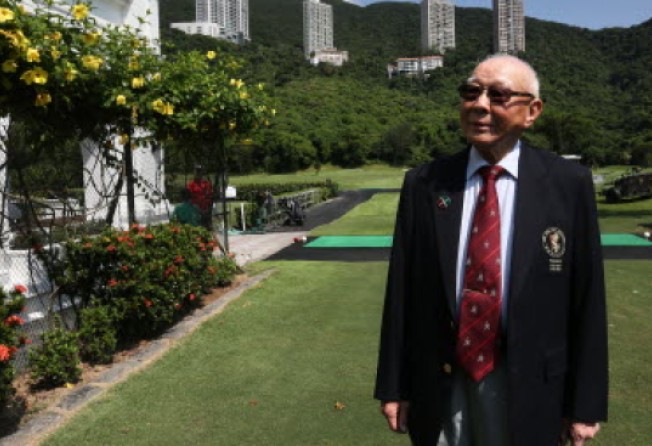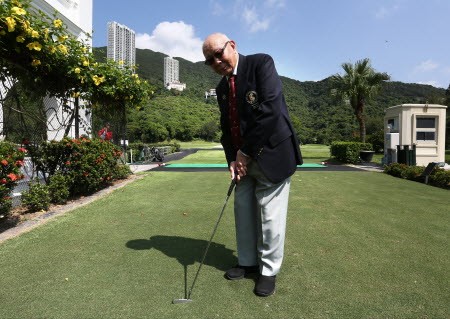From playing golf at Hong Kong's Happy Valley racecourse to fighting the Japanese: 92-year-old Willie Woo goes down memory lane
92-year-old icon relives the old days of golf in Hong Kong

Willie Woo smiles softly at the memories and he begins to talk about his love of golf, and about the love of his life.
“My family had come to Hong Kong in 1936 and my father started playing at Happy Valley,” says the 92-year-old. “There was a nine-hole course then inside the racecourse. I think I might be the only surviving person to have played on that course.”
By the mid-1950s Woo had become a member of the Hong Kong Golf Club, and he had also met Simmy, the woman who was to become his wife.
“She still keeps me company to this day,” says Woo. “We have been playing together since 1959. Before that she played with her friends but since we met we have always played together. It is something that has brought us close.”
The couple are together here today, too, as we meet at the Hong Kong Golf Club at Deep Water Bay, but Simmy Woo wants the attention to be focused on her husband and his reflections on a life spent on and around the HKGC’s courses.
“He has all the stories to tell,” she says.
And so Willie Woo picks up on how as a boy he had first been lured to the golf through his father’s obsession and through his connections at the Qingdao Universal Golf Club.
He points to a young boy in the corner of a faded photo from 1935 and says “That’s me” before recounting how his father had befriended the Qingdao mayor, who was mad for golf and always on the look-out for a playing partner.
“I was a child with time on my hands,” says Woo. “So he would send his official limousine to pick me up so I could join him.

Woo's family moved south as the 1930s came to a close and Japanese forces marched into China. First it was to Shanghai and then on to Hong Kong. When Japan attacked the city on December 8, 1941, Woo had recently finished his first year at Hong Kong University.
In those days not many Chinese people played golf, or even knew what it was all about. Their misconception was that they would say to me ‘Oh, so you hit the ball and then you chase after it?'
“I said to my father I will go to China but we can leave my brother here with you,” Woo recalls. “If something happens to me then you will still have a family. So I went to serve in the war in China.”
The fact he was multi-lingual meant Woo was quickly recruited by the American-led Office of Strategic Services and he served gathering intelligence that could be used against the Japanese.
When the war ended he was tasked with getting the Americans out of China as civil war took hold.
“We were attacked by the communists, who blew up our car as we were trying to escape,” he says. “The American officer with us tried to run but was shot and wounded. Luckily, they let us go after a night and we made our way to Shanghai and safety.”
The end of hostilities in 1945 allowed a welcome return home to Hong Kong for Woo, and the golf clubs were soon dusted off too. But, he says, a lot of people in Hong Kong had difficulties when it came to their perceptions of the game.
“In those days not many Chinese people played golf, or even knew what it was all about,” says Woo. “Their misconception was that they would say to me ‘Oh, so you hit the ball and then you chase after it? You hit it in the hole then pick it up and go on to the next one. Where’s the fun in that?’
“They didn’t know that once you take up golf, there are many things to learn from playing.”
And Woo says its lessons about life in general he has learned out on the course that have been the game’s legacy.
“The thing is golf gives you good training of the mind in terms of learning patience and in building good character,” says Woo. “Plus it is a challenge. Everyday it is a challenge.”
Kim Hall was a friend and he was very keen to get the Hong Kong Open started. He talked a lot with the Australian golfer Peter Thompson and that’s how it all started. I used my connections to help get Taiwanese players here
Woo joined the HKGC in 1955 and became among the first local players to represent the city in the Interport events that had sprung up across China and Asia, along the way winning the inaugural National Cup competition there in 1956. The massive trophy that came with that particular victory still takes pride of place in the Woo household.
Woo was instrumental in helping the first Hong Kong Open get off the ground in 1959 – helping lure the Taiwanese pros to event and watching on as the island nation’s Lu Liang-huan became its first champion.
“I was single in those days and would go up and stay the weekend at Fanling and sometimes play 54 holes over the two days,” says Woo.
“Kim Hall was a friend and he was very keen to get the Hong Kong Open started. He talked a lot with the Australian golfer Peter Thompson and that’s how it all started. I used my connections to help get Taiwanese players here.”
Woo would captain the HKGC in 1977 and he’s played a role in much of the club’s general development over the past six decades.
A career in insurance was supposed to end in the 1970s but he found he enjoyed being busy too much and to this day still runs an office and turns up each day to keep an eye on its operations.
And there’s still golf each weekend and on public holidays, with Simmy as a playing partner as often as their schedules will allow.
“Once you pick up the game you appreciate it and it teaches you things like patience, honesty,” says Woo.
“You need quick reflexes. You need to solve problems very quickly and you play when you are young and you play when you are old.”
